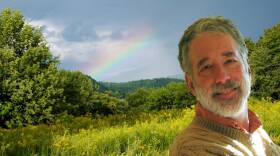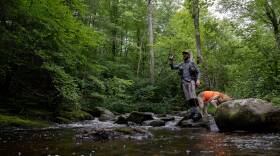-
Federal climate programs are 'laser-focused' on justice
Funding that rolls out this fall expands on the Biden Administration's Justice40 initiative. -
Healey unveils 'groundbreaking' policies on biodiversity and single-use plastic
Gov. Maura Healey spoke about the initiatives at the Clinton Global Initiative meeting in New York City. -
Addressing the Threat to Earth System Boundaries
Earth Commission, the prestigious international group of scientists, recently published a study that is receiving a great deal of attention. The study in Nature Journal indicates that we have now breached most of the Earth system boundaries that include climate, biodiversity, fresh water, soil and air. Millions of people have already been displaced, worldwide health is threatened, extinctions are accelerating, ecosystems are being destroyed. The authors emphasize two things: (1) that urgent action is required to save the planet; and (2) action must include justice for the masses who are suffering the results of global destruction.Partner:Science for the Public -
Diana Liverman, PhD
Diana Liverman is has led and served with a number of national and international projects and committees including the Earth Commission of Future Earth, the US-NRC Committee on the Human Dimensions of Global Environmental Change, the US-NRC panel on Informing America’s Climate Choices, the scientific advisory committee for the InterAmerican Institute (IAI) and the ICSU Global Environmental Change and Food Systems (GECAFS) project. She was an IPCC lead author for several assessments including the 2018 Special Report on 1.5C and a review editor for the 2022 Sixth assessment Working Group 2. Dr. Liverman is a member of the US National Academy of Sciences, and a fellow of the British Academy. -
Regenerating Life: a New Look at the Climate Crisis
As many interconnected climate crises escalate, we are challenged to see what we have overlooked in our understanding of the causes - and of what the best path forward might be. John Feldman’s film, Regenerating Life, proposes that it is humankind's destruction of nature that has been a primary cause of the climate crisis and that it is in nature we find crucial solutions. Feldman traveled widely to meet people who are working on solutions, innovative ways to repair the damage done to our extraordinary home. By working with nature, they are restoring the forests, fields, wetlands, and oceans, and are regenerating soils to grow healthy food and build healthy communities.
John Feldman is joined in conversation by environmental journalist and author Judith D. Schwartz whose books also present leading scientists and regenerative practitioners.Partner:Biodiversity for a Livable Climate -
John Feldman
John Feldman’s career spans over 40 years and covers a wide range of genres, from independent dramatic feature films and documentaries, to experimental, educational, and business films. His films have won numerous international awards. Feldman’s current film Regenerating Life looks at the climate crisis from an ecological perspective. Prior to this he made Symbiotic Earth (2018), a documentary about the maverick scientist Lynn Margulis, which combines his lifelong passions for filmmaking and the natural sciences. Since 2005 he has focused on making documentaries in the arts and sciences including EVO: Ten Questions Everyone Should Ask about Evolution (2011, CINE Golden Eagle; Parents Choice Award); Energy and You: Renewable Resources and Innovative Solutions (2009, commissioned by San Diego County Office of Education); The Little Plant that Could IS BACK (2013, about a community-based hydroelectric plant); and video portraits of Jessye Norman, Ming Cho Lee, Helen Frankenthaler, and Merce Cunningham (2007, commissioned for the Nelson A. Rockefeller Awards). His earlier feature fiction films include Alligator Eyes (1990, first prize at the San Sebastian International Film Festival), Dead Funny (1995), and Who the Hell is Bobby Roos? (2002, “New American Cinema Award” at Seattle International Film Festival). -
At Burning Man, storms keep festivalgoers stranded in the mud
Tens of thousands of revelers are stranded by heavy rain and mud at the annual Burning Man festival in Nevada. Authorities confirmed one death, which is under investigation. -
New England summer theater faces climate challenges, but the show goes on
Actors are sweating through outdoor Shakespeare while others are forced to relocate shows because of flooding. -
A longer fruit-growing season in the Northeast, but with considerable trade-offs
Climate change could potentially allow for new plant varieties in the Northeast. -
Fly fishing's treasured species are feeling the heat from extreme weather events
Advocates for New England's cold-water fish — trout and salmon — say changes to their habitats are already impacting their longevity.









